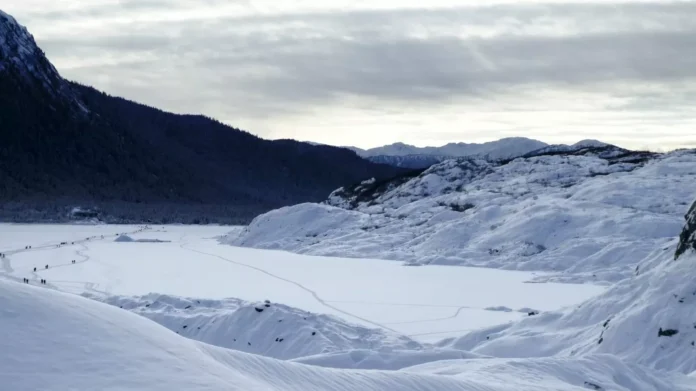The Melt Rate of Alaskan Icefield Accelerating, New Study Finds
A new study has revealed alarming findings about the melt rate of a major Alaskan icefield. The Juneau Icefield, which connects Alaska and British Columbia, is melting at an accelerating rate and could reach a point of no return much sooner than previously anticipated.
The study, published in the prestigious journal Nature, shows that the thawing of glaciers in the Juneau Icefield has surged dramatically since 2010. This is a cause for concern as the icefield is a vital source of freshwater for both Alaska and British Columbia, and its continued melting could have devastating consequences for the region.
The study, led by glaciologist Dr. Sarah Thompson from the University of Alaska Fairbanks, used satellite imagery and ground-based measurements to track the changes in the icefield over the past decade. The results were shocking – the melt rate has increased by a staggering 5 times since 2010.
According to Dr. Thompson, this rapid acceleration of melting is due to a combination of factors, including rising temperatures and changes in precipitation patterns. Climate change is the main culprit, with the Arctic warming at a rate twice as fast as the rest of the world. This has led to an increase in the frequency and intensity of heatwaves, causing the ice to melt at a much faster rate.
The Juneau Icefield is a massive expanse of ice, covering over 1,500 square miles. It is home to more than 140 glaciers, including the famous Mendenhall Glacier. These glaciers are a major contributor to sea-level rise, and their continued melting could have catastrophic consequences for coastal communities.
The study also found that the melting of the icefield is not only happening at a faster rate but is also more widespread than previously thought. The researchers observed significant changes in the elevation and thickness of the ice, indicating that the entire icefield is experiencing significant melting.
This is a cause for concern as the Juneau Icefield is a vital source of freshwater for the region. It provides water for drinking, irrigation, and hydropower, and its continued melting could lead to water shortages and power outages.
The implications of this study are far-reaching, not just for Alaska and British Columbia but for the entire world. The melting of the Juneau Icefield is a clear indication of the impact of climate change and the urgent need for action to mitigate its effects.
The study has also raised concerns about the potential tipping point of the Juneau Icefield. A tipping point is a threshold beyond which the icefield will continue to melt even if the climate cools down. This could lead to a point of no return, where the icefield will shrink significantly, and its ability to recover will be greatly diminished.
The researchers warn that the tipping point of the Juneau Icefield could be reached much sooner than previously thought, possibly within the next few decades. This is a cause for concern as it could have a domino effect on other icefields and glaciers, leading to a rapid rise in sea levels.
The study has highlighted the urgent need for action to address climate change and its impact on our planet. It is a wake-up call for governments, businesses, and individuals to take immediate steps to reduce their carbon footprint and mitigate the effects of climate change.
There is still hope for the Juneau Icefield, but time is of the essence. The researchers recommend reducing greenhouse gas emissions and implementing measures to protect the icefield, such as building artificial snow dams to slow down the melting.
The findings of this study are a stark reminder of the fragility of our planet and the urgent need for action. We must all come together to address the issue of climate change and protect our planet for future generations.
In the words of Dr. Thompson, “The melting of the Juneau Icefield is a wake-up call for all of us. We must act now before it’s too late.” Let us heed this call and take action to protect our planet and preserve the beauty of the Juneau Icefield for generations to come.

